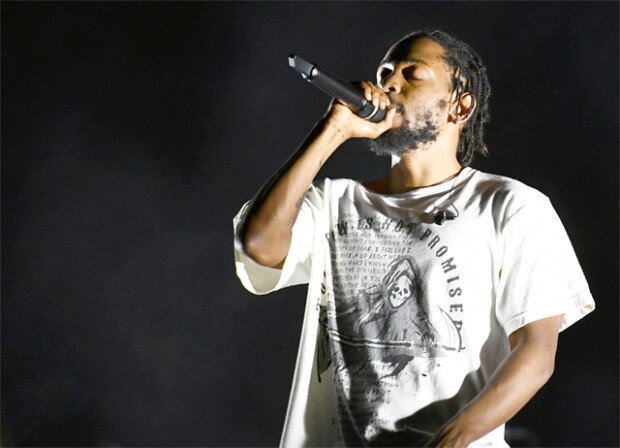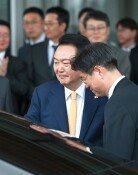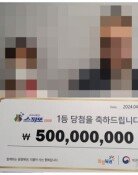Pulitzer Prize winner Kendrick Lamar performs in Seoul
Pulitzer Prize winner Kendrick Lamar performs in Seoul
Posted August. 01, 2018 08:04,
Updated August. 01, 2018 08:04

With the starting of the performance at 8:00 p.m. Monday, the phrase “Pulitzer Kenny,” Kendrick’s nickname, appeared on a large screen. American rapper Kendrick Lamar, whose real name is Kendrick Duckworth, started his first concert in Korea with a swag.
Lamar is close to the “21 century Bob Dilan.” By proving the literary value of music with raps, the 31-year-old was the first hip-hop artist to receive the Pulitzer Prize. He started his concert by self-celebrating this honor in front of 20,000 people. A half century-year-old history of popular music seemed fast forwarding in just three days after Bob Dilan’s recent concert in Korea.
Lamar started his concert with the song “DNA,” which tells people what his DNA is comprised of. He rapped 18 different songs for 70 minutes by inserting loaded words into the waves of rhythms as if he switched sniper rifles and shotguns.
Stage management was simpler than expected. Short video clips or pictures were projected repeatedly on three screens and there was no bombastic staging he showed at the Grammy and BET Awards over the past three years. He did not display dramatic settings where he would dress in prison uniform and escape with chains or rap by stepping on top of a police car. It could have been a somewhat boring performance if you had not concentrated on the narratives of the rap.
Kendrick Lamar, who is known to be the best rapper since Eminem, has won 12 Grammy trophies up until now. His albums with “Good Kid, M.A.A>D. City” (2012), “To Pimp a Butterflry” (2015) and “Damn” (2017) were praised for incorporating the hypocrisy of the American society into his outstanding raps and metaphorical lyrics.
The last song at the concert was “All the Stars,” the theme song of “Black Panther.” All the Stars expresses black heroes of the past. As the flashlight of mobile phones turn on one by one, he encouraged the audiences. “Okay, that’s good. Turn on more, more.” Who did Lamar think of watching the audiences? Could Martin Luther King Jr. whom he shouted at “Backseat Freestyle” have been one of them?
imi@donga.com







